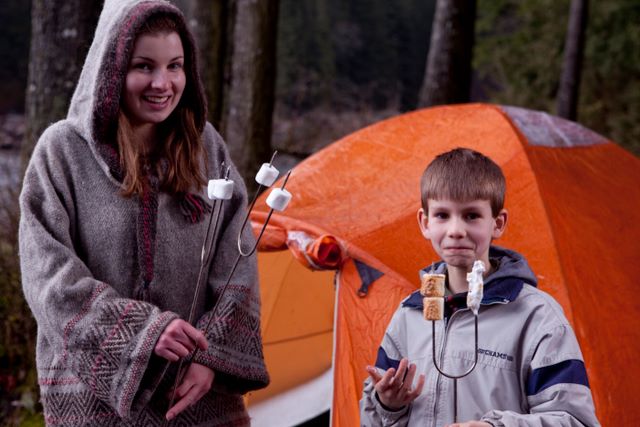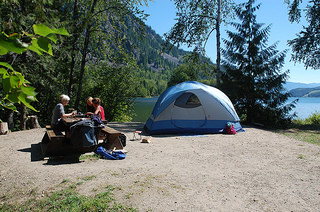
- Campers roast marshmallows
Photo by the Government of British Columbia/CC, Flickr
Tips for a short camping trip
Adapted from Wikipedia by Patti-Lea Ryan
Edited by Nila Gopaul
Level 3
NOTE for campers:
Click here to find current fire bans in BC
Checklist of things to do
before leaving home
- If you plan on taking a pet camping,
make sure the campground is pet friendly. - Charge phone batteries and other devices.
- Take your phone and devices with you,
but they may not work in all areas. - Download and print maps/guides of places
you want to go to. - Get a First Aid Kit and know how to use it.
- Write down emergency phone numbers,
including your doctor, park ranger number, etc. - Double check that you have everything on your camping checklist.
- Tell someone:
where you are going.
who is going with you.
when you expect to be back.
NOTE In case of an emergency:
You can call 9-1-1 for free
even if there is no time left on your phone.
But the phone needs to be charged.
Safety tips for campgrounds
Be sun wise
Wear hats and sunglasses.
Put on strong sunscreen 20 – 30 minutes
before going into the sun.
Children need waterproof sunscreen
if they are going in the water.
Reapply after an hour in the water.
Children should wear hats.
And T-shirts are a good idea, too.
Stay hydrated and stay cool
Drink plenty of water all day
and pack extra water in a cooler with ice.
Rest in shady areas.
Store food safely
Pack perishable items
in a cooler with lots of ice.
Spoiled food can make you and your family very sick.
Eat the fresh foods first.
Then canned food.
Don’t forget a can opener!
Food attracts bears, skunks and racoons.
Lock your food in your car or in a separate tent.
Never store food in your tent.
Never leave food out in the open.
Store it in airtight containers.
Clean your area immediately after eating.
Campground etiquette*
Consider Other Campers:
Noise level:
Most parks have a “no loud noise at any time” rule.
Ringing Cell phones:
Put the ringer on a lower level and/or vibrate.
Keep voices at normal level
in the evening.
Keep radio volume down.
Children:
Ensure children are respectful
of the other campers and belongings.
For younger children,
try to keep to the same routine
as at home such as meal times, bedtime, naps.
Bring things for them to do like books,
board games, drawing, etc.
To burn off energy, take them swimming, hiking.
Many BC Parks have nature talks.
Pets:
Some camp sites allow pets, but not all.
Check to see if yours does.
Keep your pet leashed at all times.
Find ways to keep your pet happy
with treats, toys, walks etc.
Pick up their waste.
Campfire Smoke:
NOTE: There may be a campfire ban in your area.
Ask a ranger, don’t light a fire
if no one else has one.
If there is no fire ban,
use the firewood provided by the park,
not dead tree branches.
Consider nature:
Use washable plates and cutlery,
or paper; but not plastic.
See a beautiful plant?
Please don’t pick it; take a picture.
Then others can enjoy it too.
If you have a campfire,
make 100% sure that it is OUT.
Consider your car and RV:
Within the park, only drive on designated roadways.
Stay within the posted speed limit.
Consider the next camper:
Leave the site clean for the next camper.
Take all of your belongings and garbage with you.
What to take for a weekend trip to a campground

- People enjoying their campsite
Photo by: Province of British Columbia/CC, Flickr
Camping items
Ground sheet
Sleeping pad or air mattress
Tent
Sleeping bag and pillow
Lantern (and spare batteries)
Couple of camp chair
Basin, dish cloth/towel
Repair kit for tent or air mattress
Matches if there is not a Fire Ban in that area.
Clothing (per person)
Underwear
Long underwear (top and bottom)
T-shirts (one for night)
Hiking socks
Long pants
Shorts
Lightweight long-sleeve sweater
Runners for trails
Flip-flops or flat sandals
Large brim sun hat, etc.
Rainproof jacket with hood
Cooking and Cleaning
Cup, plate, bowl and cutlery
Dish detergent and pot scrubbers
Insulated cooler
Canteen or water bottle – at least one quart.
Bright plastic tablecloth with flocked backing.
(It’s pretty and easy to clean)
Camp stove and fuel
Cookset – Pots and pans and cooking utensils, enamel coffee pot
Can opener, bottle opener and cork screw
Energy bars, trail mix, marshmallows, etc.
Medicine
First-aid kit
Prescription medicine and Epi Pen if allergic to insect bites
Glasses and/or contact lenses
Sunglasses with UV protection
Miscellaneous
Paper and pen
Knife or multi-tool
Water containers
Ziploc bags
Toiletries and personal items
Toothpaste and tooth brush
Soap and shampoo
Towel/facecloth
Sunscreen and lip balm
Insect repellent
Backpack for day excursions
Definitions:
*Etiquette: polite ways to behave in a culture;
good manners